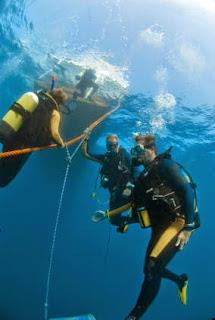
Periodic checks with your dive buddies while diving is always a good thing. Things can start to develop in a negative way, and fast. Just because you met your dive buddies on the hang line from the boat, or the edge of the cliff before descending into the abyss, does not mean something did not change. Things can happen at a moments notice. Descent checks are vital to the success and enjoyment of every dive.
Every now and then I’m on a road trip with my family where we are caravanning with other people. Prior to departure for the trip, we will plan out our schedule and where we are stopping, especially if we are separated. Fortunately, today’s technology allows us to get up-to-date information with our phones by calls, text messages, or someone posting a status update on social media.
Scuba diving, on the other hand, does not have the luxury of technology while diving. Although some manufactures have created underwater housings for smartphones, most tech divers will not be bringing this along for a few obvious reasons. We do not have the luxury of saying "hey buddy, I need a little help" before you reach your final destination, such as a shipwreck at 150 feet. In a perfect world, maybe things will go just fine. The slightest problems can still happen between the surface and 100 feet while descending. I can list at least a dozen issues that have actually occurred on tech dives.
This is why descent checks are so important. To complete a descent check, you would perform the following tasks.
Check dive buddy for any bubbles from leaks in:
regulators,
hoses and
tank valve or manifold (double tanks).
Make sure the hoses are properly routed, especially on a tech diving set up
Perform a simulated out of air and donate your long hose to make sure it is free from deco tanks and other hoses.
Ensure the canister light wire is free and clear for easy use when needed.
Ensure the deco tanks are in the right spot:
stacked in right order, or
tanks are on the correct side to prevent switching to wrong gas.
Check to make sure everyone is OK for the dive:
Someone may need to catch their breath from currents/task loading
A diver may be disorientated for a moment and need a few seconds to regain the missions focus.
There could be a chance a diver is having a bad day.
Aborting a dive at shallower depths increases the safety of the entire dive team.
Going deeper with this ’bad day’ on your back will only accelerate problems when it is more difficult at depth to handle (cold, dark, enclosures, narcosis, etc).
The general rule I have used is to have at least two check points of any dive, regardless of depth. Typically, the first stop is done around 20 feet. The second spot will be a midpoint of the dive. For example, if you were going to 100 feet, you would stop at 20 feet and then 50 feet and then a final check once we reach 100 feet. You can modify this based on landmarks or turn points in the dive, such as a cliff or an actual turn. A check once you reach the bottom or destination adds a safety buffer. Especially when you are diving in cold, dark and arduous environments.
In a perfect world, these things should not happen to experienced tech divers, but they do. Why?
Murphy’s Law
We are human
The descent check should also be done on recreational dives. If you are planning a 40 foot dive, you can do a check just below the surface around 10 feet and a check at the 40 foot mark. You may not do all the things a tech diver would do, such as a simulated out of air with a long hose. However, the principles are still the same by adding a safety margin to the dive.
The purpose of a descent check is to increase the safety of each dive, recreational or technical. By adding this safety margin to the dive, it brings more confidence in scuba divers and the dive team. Everyone knows if you increase your confidence the enjoyment of the dive goes way up. This is the reason we dive. Go enjoy the underwater world.
Article Source:
EzineArticles.com/?expert=Butch_ZemarKathy Dowsett
kirkscubagear.com